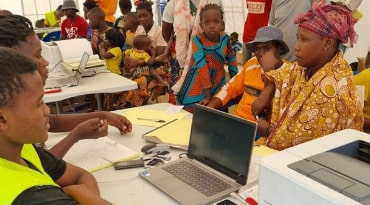There has been respite for thousands of Internally Displaced Persons (IDPs) in Mozambique as a civil registration and ID card issuance campaign is underway thanks to support from the World Bank’s Identification for Development Initiative (ID4D).
The program started in May 2022 and is still in its pilot phase. It has already touched the lives of about 21,000 IDPs who now have legal identity, allowing them to take on formal employment and access services such as training, education, and health, according to an interview of two experts involved in the project implementation, published as a World Bank blog.
The project is designed in a way that ID cards and birth certificates are issued in one process.
In the interview, Tiago Peixoto, senior public sector specialist at the World Bank’s Governance Global Practice, and Lizardo Narvaez Marulanda, senior disaster risk management specialist for the Bank’s Recovery Project, NCRP, both underscore the importance of the project for Mozambique, currently experiencing a humanitarian crisis from an insurgency in the north of the country.
Peixoto explains that the lack of an ID “prevents access to schooling, health services and, later in life, banking, pensions, and property transactions” and also “deprives Mozambicans of basic rights, such as the right to vote in elections, which weakens accountability systems and the social contract between the state and its citizens.”
The situation is even worse for IDPs compared to others, the specialists say, as many of them have been forced out of their original homes, most of them losing their sources of livelihood in the process.
The project appears to be already proving useful for the target population, but Peixoto and company believe its real impact cannot be fully measured as yet.
However, Peixoto says “the most obvious benefit to recipients will be their ability to prove their legal existence to access justice, services, and benefits.”
To Marulanda, the civil registration drive has the potential to increase “the participation of displaced people and their host communities in peace-building spaces.”
“We can’t yet evaluate individual perceptions of this activity, but it is important to note that other actors, including the private sector, have shown interest in supporting this process and in replicating the model in other districts in Cabo Delgado.”
The ID project, according to Peixoto and Marulanda, is also to bolster data protection efforts in the country, by avoiding a situation where “multiple government agencies and development actors start collecting personal data on their own, increasing exposure to risks.”
UNHCR using biometrics to build lives of IDPs, refugees
Meanwhile, the United Nations High Commissioner for Refugees, Filippo Grandi, has emphasized the importance of digital technology in responding to challenges faced by IDPs and refugees. He also highlights how the UN body is using biometrics to fix the shattered lives of people in these categories.
In a presentation at the World Economic Forum in Davos earlier this month, Grandi stated that these forcibly displaced persons need technology to either connect with friends and family, get employment, or engage in other life-saving activities such as benefiting from aid programs by governments or international humanitarian organizations.
“We use biometrics as part of refugee registration, to provide identity documents, distribute cash through ATMs, and improve various legal and protection functions,” said Grandi.
“Looking ahead, we are exploring the use of technologies such as blockchain and artificial intelligence to see how they can be further integrated into our work, as we prepare for new and ever-changing humanitarian challenges.”
Notwithstanding, the UNHCR Chief says there are a number of obstacles and threats which IDPs and refugees face emanating from the use of these technologies.
These obstacles and threats, he believes, have to be addressed so that these forcibly displaced persons can make the most of digitally technology.
“Digital innovators must help us to upgrade the humanitarian response for the 21st century. In just under a year from now, the 2023 Global Refugee Forum will present the ideal opportunity for innovators to bring us their ideas, pledges and inspiration, and help us realize the ambitions of our digital strategy.”
Article: World Bank is helping the displaced in Mozambique get IDs, birth certificates
